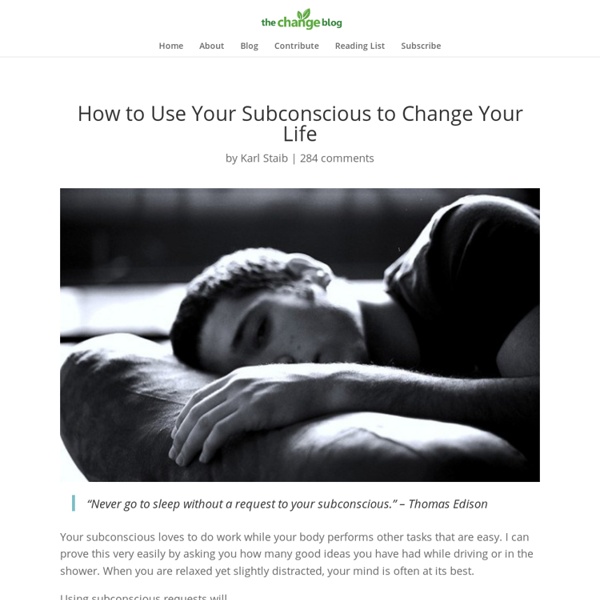Cymatics
Resonance made visible with black seeds on a harpsichord soundboard Cornstarch and water solution under the influence of sine wave vibration Cymatics (from Greek: κῦμα "wave") is the study of visible sound co vibration, a subset of modal phenomena.
How to Have Less Awkward Conversations: Assuming Rapport
Image by kalandrakas. Assuming rapport. This is definitely one of the best social skill tips I have ever learned about. Unfortunately I’ve forgotten a bit about it lately. Maybe you have too.
Tomorrow Starts Today
Tomorrow Starts Today Three little words that have been bouncing around in my head the last week or so. This morning as I was getting ready for work, psyching myself up for the day, telling myself that I WILL have a good day, preparing myself for the daily “beatdown” as I like to call it… those three words are screaming at me. And I realized… I’m not hopeless, I’m not stuck here in a job I hate, I can change my situation if I want to. For me, visualizing the end result and thinking about where I want to be in one or two years is overwhelming.
Fallout 101: I: Once Upon a Time...
<-- Read the Prologue Fallout 101 “You have been in biological stasis; decreased mobility is expected. In accordance with Genesys company policy, we ask that you please wait for authorized medical personnel to assist you in exiting the bio-stasis chamber.
Sacred geometry
As worldview and cosmology[edit] The belief that God created the universe according to a geometric plan has ancient origins. Plutarch attributed the belief to Plato, writing that "Plato said God geometrizes continually" (Convivialium disputationum, liber 8,2).
30 Habits that Will Change your Life
Developing good habits is the basic of personal development and growth. Everything we do is the result of a habit that was previously taught to us. Unfortunately, not all the habits that we have are good, that’s why we are constantly trying to improve. The following is a list of 30 practical habits that can make a huge difference in your life. You should treat this list as a reference, and implement just one habit per month.
20 Ways To Train Your Brain For Peak Performance
In order to stay sharp, it is important that you exercise your brain. The less we use our minds, the duller they become. There is a lot of emphasis these days on staying physically healthy, but we should also be concerned for our mental well-being. Our brains continue to expand and adapt to the stimuli they receive throughout our lives. The more we take care of our brains, the better thinkers we become. Here are twenty ways that you can develop a training regimen for your brain!
Getting started with "Getting Things Done"
This article was originally posted during the first week of 43 Folders' existence, and, pound for pound, it remains our most popular page on the site. Please be sure to also visit related pages, browse our GTD topic area, plus, of course you can search on GTD across our family of sites. I’ll be talking a lot here in coming weeks about Getting Things Done, a book by David Allen whose apt subtitle is “The Art of Stress-Free Productivity.”
Subconscious
In psychology, the subconscious is the part of consciousness that is not currently in focal awareness. The word subconscious is an anglicized version of the French subconscient as coined by the psychologist Pierre Janet, who argued that underneath the layers of critical thought functions of the conscious mind lay a powerful awareness that he called the subconscious mind.[1] Because there is a limit to the information that can be held in conscious focal awareness, a storehouse of one's knowledge and prior experience is needed; this is the subconscious.[2] The subconscious and psychoanalysis[edit] The subconscious is commonly encountered as a replacement for the unconscious mind and therefore, laypersons commonly assume that the subconscious is a psychoanalytic term; it isn't.
60 Small Ways to Improve Your Life in the Next 100 Days
Contrary to popular belief, you don’t have to make drastic changes in order to notice an improvement in the quality of your life. At the same time, you don’t need to wait a long time in order to see the measurable results that come from taking positive action. All you have to do is take small steps, and take them consistently, for a period of 100 days. Below you’ll find 60 small ways to improve all areas of your life in the next 100 days. Home 1.
How to Build Self-Discipline
Discipline is freedom. You may disagree with this statement, and if you do you are certainly not alone. For many people discipline is a dirty word that is equated with the absence of freedom. In fact the opposite is true. As Stephen R.
The List Blog
10 Strange Events, People, & Locations Many strange and unexplained events have taken place in history. Peoplehave made discoveries and witnessed bizarre phenomenon.
Unconscious mind
Some critics have doubted the existence of the unconscious.[2][3][4] Historical overview[edit] The term "unconscious mind" was coined by the 18th-century German romantic philosopher Friedrich Schelling and later introduced into English by the poet and essayist Samuel Taylor Coleridge.[5] Influences on thinking that originate from outside of an individual's consciousness were reflected in the ancient ideas of temptation, divine inspiration, and the predominant role of the gods in affecting motives and actions.



